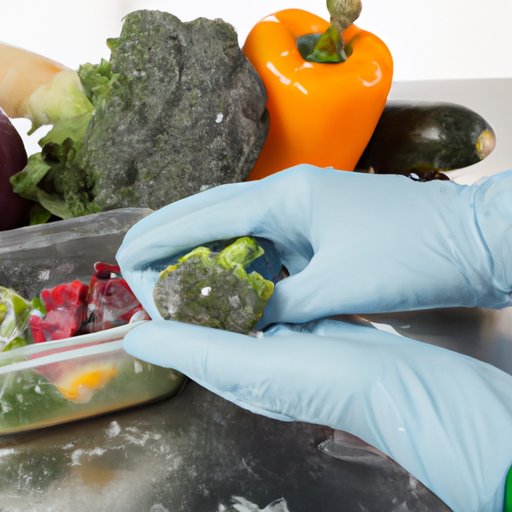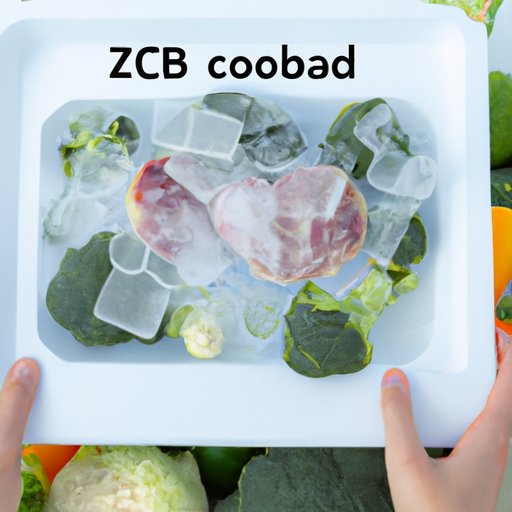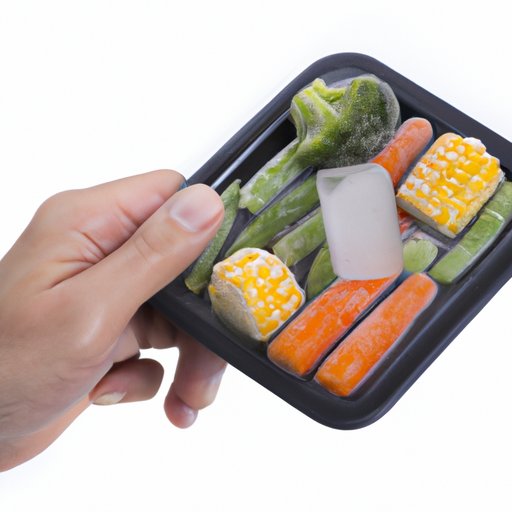Introduction
The debate over the healthiest way to consume vegetables has been ongoing for years. On one hand, there is the option of buying fresh produce from local farmers or grocery stores. On the other, there is the convenience of purchasing pre-frozen vegetables. But are frozen vegetables as healthy as fresh? This article will explore the nutritional content, environmental impact, cost-effectiveness, and consumer perception of frozen versus fresh vegetables in order to provide an in-depth look at this debate.
Comparing the Nutritional Content of Frozen and Fresh Vegetables
When it comes to assessing the nutritional content of frozen and fresh vegetables, the results may surprise you. According to a study published in the Journal of Food Science, “there were no significant differences between the nutrient composition of fresh and frozen vegetables.” In other words, frozen vegetables contain the same amount of vitamins and minerals as fresh vegetables. This means that both frozen and fresh vegetables are equally nutritious.
In addition to having similar nutrient compositions, frozen and fresh vegetables also provide the same nutritional benefits. Eating either type of vegetable can help reduce the risk of chronic diseases, such as heart disease and diabetes, due to their high levels of vitamins, minerals, and fiber. They are also low in calories and fat, making them a great choice for those looking to maintain a healthy weight.

Investigating the Impact of Freezing on Vegetable Quality
Although frozen and fresh vegetables have similar nutrient compositions, there is one area where they differ: texture. The freezing process can cause some vegetables to become softer and less crisp than their fresh counterparts. However, this is not necessarily a bad thing. The softer texture of frozen vegetables makes them easier to blend and use in soups and sauces.
Freezing also has an effect on flavor. Some people believe that frozen vegetables do not taste as good as fresh ones. While this may be true for some vegetables, research has shown that the freezing process does not significantly impact the flavor of most vegetables. In fact, some studies have even found that frozen vegetables retain more of their flavor than fresh vegetables because they are picked and frozen at peak ripeness.

Examining the Environmental Impact of Growing and Shipping Frozen Vegetables
Another factor to consider when deciding between frozen and fresh vegetables is the environmental impact of growing and shipping them. Studies have found that frozen vegetables often have a lower carbon footprint than fresh vegetables, due to the energy used in growing and shipping them. For example, one study found that frozen vegetables required 17 percent less energy to produce than fresh vegetables.
In addition to having a lower carbon footprint, frozen vegetables also require less energy to transport. Since they are already frozen, they do not need to be kept cold during shipping, which reduces the amount of energy needed to get them from the farm to the store.
Exploring the Cost-Effectiveness of Buying Frozen vs. Fresh Vegetables
When it comes to cost, frozen vegetables are usually cheaper than fresh ones. A price comparison of frozen and fresh broccoli revealed that frozen broccoli was nearly 50 percent cheaper than fresh broccoli. This cost savings can be attributed to the fact that frozen vegetables do not need to be shipped as quickly, which reduces the cost of transportation.
It is important to note, however, that cost savings can vary depending on the type of vegetable. For example, frozen corn is usually more expensive than fresh corn due to the added processing required for freezing. Therefore, it is important to compare prices before making a purchase.

Reviewing Consumer Perception of Frozen Vegetables
Consumer perception of frozen vegetables is another factor to consider when deciding between fresh and frozen. Unfortunately, there are still many misconceptions about frozen vegetables, such as the belief that they are not as nutritious as fresh vegetables. As previously mentioned, however, research has shown that frozen and fresh vegetables have similar nutrient contents.
In addition to being just as nutritious as fresh vegetables, frozen vegetables also have some advantages. For example, they are convenient and easy to prepare. They also last longer than fresh vegetables, reducing food waste. Finally, they are often cheaper than fresh vegetables, making them a more cost-effective option.
Conclusion
In conclusion, frozen and fresh vegetables have similar nutrient compositions, nutritional benefits, and environmental impacts. When it comes to cost-effectiveness, frozen vegetables are usually cheaper than fresh vegetables. Finally, while there are still some misconceptions about frozen vegetables, they have some advantages over fresh ones, such as convenience and cost-savings. All in all, frozen and fresh vegetables both offer health benefits and can be part of a balanced diet.
(Note: Is this article not meeting your expectations? Do you have knowledge or insights to share? Unlock new opportunities and expand your reach by joining our authors team. Click Registration to join us and share your expertise with our readers.)
